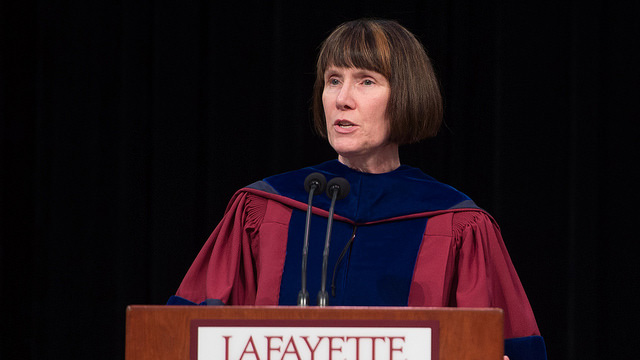By Mark Eyerly
The start of an academic year brings opportunities for College leadership to remind the community of the values that underlie a liberal arts education.
A Lafayette education “is not simply a matter of solitary mastery of information or skills. It involves dialogue, questioning, testing, experimentation,” President Alison Byerly told new students and their parents at Convocation. “This process of active engagement begins in the classroom, with dedicated and creative faculty who will challenge you with new areas of study and new ways of looking at topics you may have thought were familiar.”

Dean of the Faculty Robin Rinehart
Then, with a nod to the political strife that has gripped some campuses, she added: “Being part of this broad community includes the responsibility to be respectful and open-minded when you encounter views with which you disagree. We hope that when that happens, you will respond with thoughtful arguments based on evidence and values.”
Addressing the first faculty meeting of the academic year, Provost Abu Rizvi outlined the “three things a college is supposed to do.” They are, he said:
- “Be a powerful engine of upward mobility.”
- “Prepare students for citizenship.”
- “Develop the private and personal lives and experiences of students.”
“Our college has to be a place where debate and discussion among different views is not only allowed, but also encouraged,” Rizvi said. “We have to be able to model and demonstrate a way of addressing differences. For when, in the face of polarized opinions, there is no way for people to meet to resolve them, they will seek other means. The academic way of deliberating about our affairs, which relies on reason and evidence, once discarded, leaves only force and power.”
He added: “A college education falls flat if students gain knowledge but don’t develop a disposition to use it. If college is just about learning things and not loving to do them we haven’t done enough. We want students to fall in love with what they learn, to see in a poem, an equation, a passage, a method, a practice—to see in them beauty, importance, and value, such that they will return to them throughout their lives.”
Dean of the Faculty Robin Rinehart shared with new students advice she said came from her faculty colleagues. Among the tips for getting the most out of their Lafayette education:
- Own your education and build yourself as an intellectual. “To do that you need to be open and curious but driven by your own sense of purpose.”
- “Have the humility to know that you don’t know everything and the courage to admit when you don’t understand something.”
- “Take at least one course that is out of your comfort zone.”
Vice President for Campus Life Annette Diorio told parents that staff in her division work with colleagues in the academic division to “ensure that education happens everywhere and anywhere—in our residence halls, student organizations, athletic and intramural fields, and through leadership and service opportunities…. We challenge students to try new things, to think critically, and to begin to own who they are.”
As Byerly said in concluding her convocation address, “It is a natural tendency to gravitate towards people who are similar to ourselves, and technology has made it easier for all of us to find and listen to the voices with which we are most comfortable. But you will learn more, and be better prepared for the world you will enter when you leave here, if you look for opportunities to extend yourself beyond your comfort zone…. You will be in a better position to change the world and make it a less polarized and divisive place if you bring with you the habits of outreach and curiosity that we try to foster here.”
